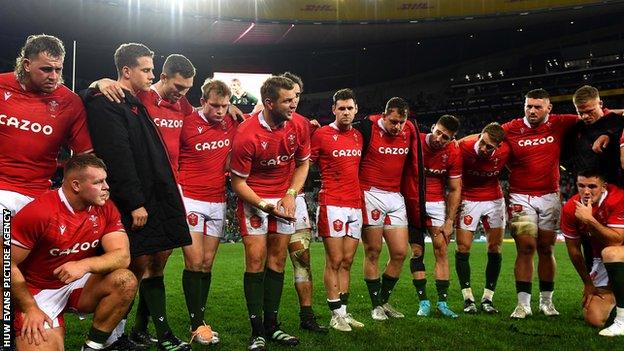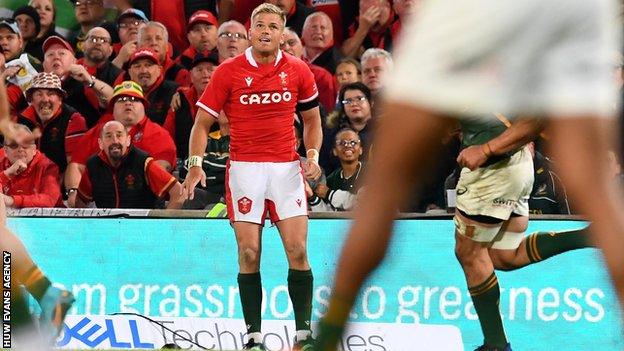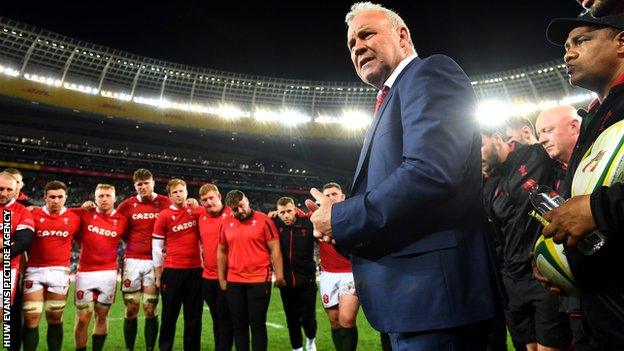South Africa 30-14 Wales: Defeat for tourists but pride restored against Springboks
- Published

Wales captain Dan Biggar addresses his squad after the third Test defeat in Cape Town
Wales have been united in South Africa. United in victory and united in defeat in Cape Town following the third-Test series decider.
As South Africa captain Siya Kolisi led the raucous celebrations around the stadium following the 30-14 victory, this Wales touring party descended into a huddle for a moment of quiet reflection.
Everybody was there. Players, coaches, medical and backroom staff. Maybe even a rogue Welsh Rugby Union committee member could be spotted.
Head coach Wayne Pivac spoke first, captain Dan Biggar followed. They were not long addresses. Short, sharp messages to wrap up what had been a captivating three weeks.
Historical achievements, last-minute winning kicks, controversial selections, the three-match series has proved more eventful than many predicted.
Following a home humbling against Italy in March, Wales had arrived in South Africa with many expecting them to be cannon fodder against the world champions. That was not the case.
Wales' second-Test win in Bloemfontein was their first against the Springboks on South African soil, while they were beaten by Damian Willemse's last-gasp penalty in the first Test, going down 32-29.
They will note the historic win was achieved against a Springboks side that had made 14 changes for the second Test.
Wales will also reflect that they should have triumphed in the opener in Pretoria against largely the Springboks side that had won the 2019 World Cup and defeated the British and Irish Lions in a series two years later.
Pivac's team might not have managed to emulate Ireland and England's away series victories in New Zealand and Australia, they have, though, restored some pride back in the Wales jersey and offered encouragement ahead of the World Cup in France next year.
So just four months after that Italy defeat, Wales will view the tour as being successful in many facets.
Wales summer tour 'really positive' - Biggar
Reasons to be cheerful
The character of this squad was questioned after the Italy defeat, but this accusation can not be levelled at Wales now after what we have witnessed during the last three weeks.
Adversity has followed the tourists around with 91-cap and three-times Lion Taulupe Faletau forced out of the third Test just before kick-off.
Wales have also had to overcome losing leading tight-head props Leon Brown and Tomas Francis to injury.
Dillon Lewis somehow shook off injury to start all three Tests, while fifth-choice Sam Wainwright came from nowhere to make his international debut and force an important scrum penalty in the second Test win.
That character has originated from the captain Biggar who has won many plaudits in South Africa for his straight-talking and the manner in which he led his side.
He insisted they were not here for a holiday or to roll out the red carpet for the Springboks and Wales have backed up his words.
Biggar put aside personal disappointment at losing the first Test in the dying minutes when he missed a conversion and gave away the match-winning penalty.
This gnarly nature of the skipper has been evident in the dogged defensive effort under the tutelage of Gethin Jenkins and led on the field by Dan Lydiate.
Wales have also seen the emergence of previously uncapped Leicester flanker Tommy Reffell.
The 23-year-old has been the find of the tour with a man-of-the-match performance in the second Test and a try in the third.
While they helped provide the power, the poise came most notably with the champagne moment and fairytale that occurred in Bloemfontein.
Gareth Anscombe, who has battled back after being sidelined for two years with a serious knee injury and missed the birth of his baby to come on this tour, slotted over the winning conversion to help Wales create history.
That magical moment will live long in the memory of Wales fans.

Gareth Anscombe won his 32nd Wales cap as he replaced Dan Biggar in Bloemfontein
Room for improvement
Wales have at times demonstrated a clinical edge by capitalising on limited chances, typified by two opportunistic Louis Rees-Zammit tries in the first Test and Josh Adams' defining score in the second.
The task now will be to ensure they utilise their attacking weapons with a more concerted flowing attacking game.
George North returned to the centre after a year out through injury and was solid if not spectacular in the first two games as little possession came his way.
In the Cape Town decider, North demonstrated why he is still Wales' most destructive attacking weapon with trademark bursts and a brutal hand-off of Cheslin Kolbe.
Pivac's side produced glimpses of a fluent attacking style in the build-up to the brilliant Reffell try in Cape Town with North and Rees-Zammit heavily involved.
Unleashing these kind of strike runners on a more regular basis will be the next challenge.
Wales were made to pay for indiscipline with four players shown yellow cards in the first Test and the tourists reduced to 12 men late in the second half.
There were some dubious decisions against Wales with Rees-Zammit's yellow card the most contentious, but the penalty count needs to drop.
These transgressions were due to the pressure being heaped on them by the Springboks whose set-piece superiority was one of the reasons for series victory.
Wales struggled in the scrums, while the line-out creaked, most notably in the latter stages of the second and third Tests.
Replacement hooker Dewi Lake has demonstrated his potential to be an international success emphasised by his try in the first Test.
His line-out throwing accuracy under pressure needs to improve and it is worth investing even more time in this facet because of Lake's potential to be a world-class permanent fixture in the Wales front-row.
Pivac praise
The Wales head coach took a lot of flak for the loss at home to Italy with question marks over whether he would make the 2023 World Cup.
The Italy defeat meant a second fifth-place Six Nations finish during his tenure with the 2021 Six Nations title sandwiched in-between.
After making changes for the Azzurri defeat, Pivac decided he had tinkered enough and the South Africa tour would represent continuity in selection with only 17 players starting.
This policy has meant that seven of the 34-man squad did not see any action on the field.
The number of players chosen was designed to mirror the World Cup scenario next year.
He made a bold call in the original squad by picking Reffell ahead of Jac Morgan, but former' inclusion has worked.
Pivac will also have reinforcements for next season with Justin Tipuric, Ross Moriarty, Leigh Halfpenny, Ken Owens and Aaron Wainwright due to return from injury.

Wayne Pivac took over from Warren Gatland as Wales coach after the 2019 World Cup
World Cup awaits
Pivac and his coaching staff will now turn their attentions to the global tournament which starts in 14 months.
The build-up begins with an autumn series against New Zealand, Australia, Argentina and Georgia before the 2023 Six Nations and the long road to the world showpiece in France.
The players will go back to their clubs and regions now. It is important to note any sense of a feel-good factor should not detract from the problems that beset Welsh rugby. They remain.
WRU bosses have been in South Africa to witness the international scene, but they must turn their attention to helping the domestic game and the professional sides.
At least the backdrop is a little brighter.
Wales do not want to be heroic losers. But these three weeks in South Africa have ensured they have taken a step back in the right direction.

SLAMMED: The rise of the Wales rugby team
A CAREER CHANGE WITH A DIFFERENCE: Police new recruits adapt to life on the beat
